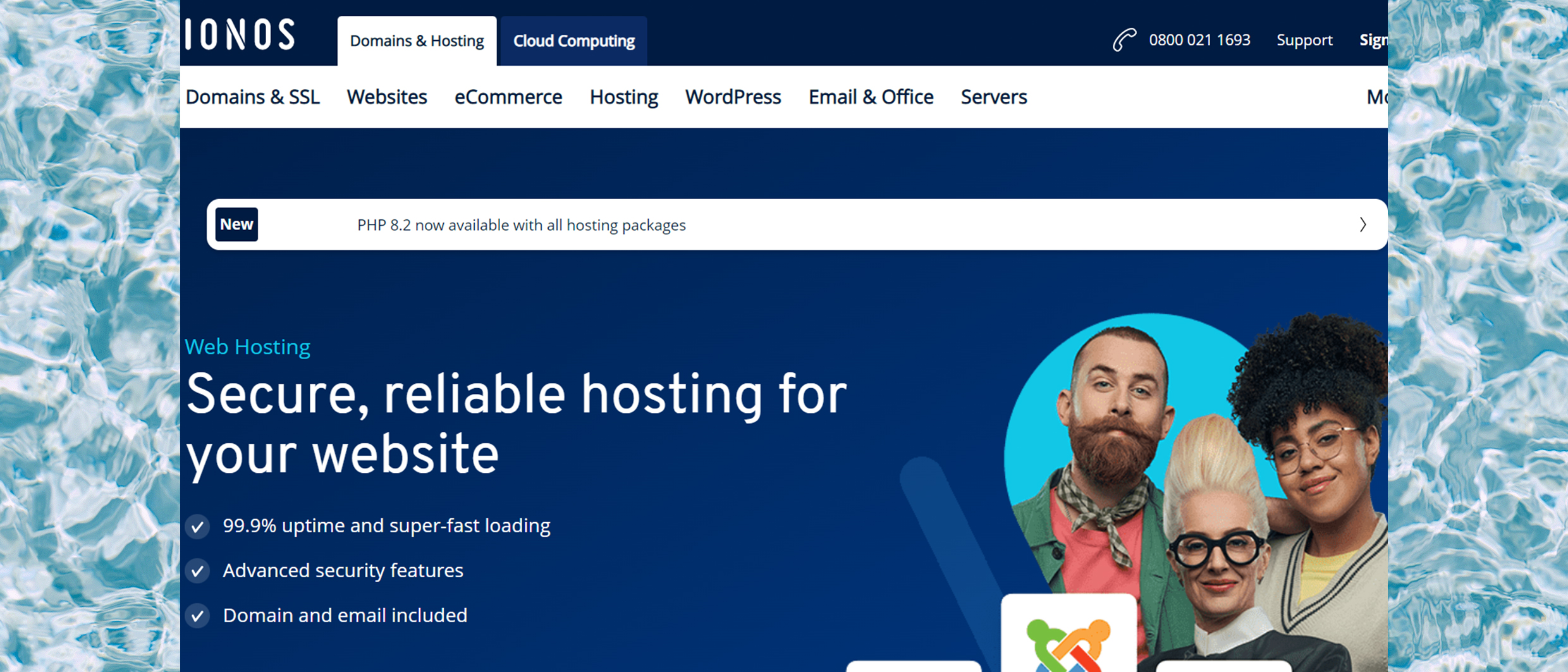TechRadar Verdict
IONOS shared hosting doesn't quite match the best of the competition, but the company scores everywhere else with its huge range of products, low headline prices, and extensive WordPress and VPS products. Give it a try.
Pros
- +
Vast range of products and plans
- +
Low starter prices and many special offers
- +
Daily backups with shared hosting plans
- +
Linux and Windows plans
- +
Ten data centers in USA and Europe
- +
Powerful cloud hosting
Cons
- -
Slower than average shared hosting
- -
Just one email account included with the shared plans
- -
No free migration
- -
Only four dedicated hosting plans
Why you can trust TechRadar
Founded in Germany in 1988, IONOS (formerly known as 1&1 Hosting) is a web hosting giant and one of the best web hosting providers with 2,000 employees, 10 data centers, more than 90,000 servers, and 8 million customer contracts worldwide.
Putting that into perspective, Datanyze says IONOS (still listed there as 1&1) has a 7.4% share of the web hosting market: that's ahead of everyone but Google Cloud (8.37%), Amazon AWS (20.16%), and GoDaddy (7.53%). In an industry crowded with service providers, it's a remarkable achievement and a testament to its resilience.
What types of hosting does IONOS offer?
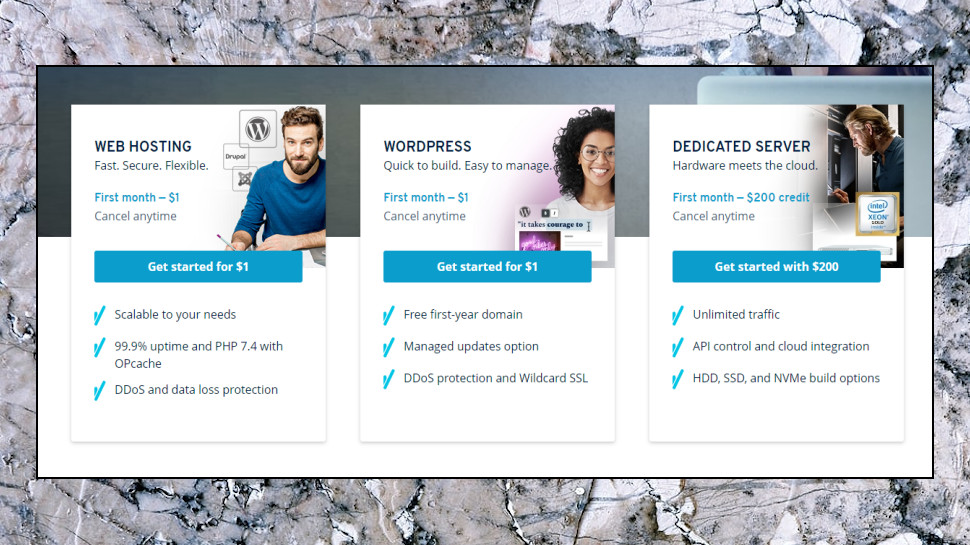
IONOS offers plans covering a wide range of hosting types and needs. Low-cost shared hosting, website builder plans, and managed WordPress plans are ideal for personal and small business sites.
More powerful VPS, cloud, and dedicated hosting have the resources to handle more demanding business and ecommerce sites (and if it's web stores you're after, there's managed WooCommerce hosting, too).
IONOS is also one of the few remaining service providers offering Windows-based ASP.NET hosting. It's also great for devs, thanks to its Deploy Now plans that make an easy 3-step build-and-deploy to GitHub process possible.
For high-flyers, there is also a pathway to the heavens via cloud and dedicated servers. The wide variety of options lets you choose between AMD- and Intel-based servers for either computer- or storage-focused plans.
There isn't the space to cover every detail of what IONOS has to offer, but scroll down, and we'll break down the company's key ranges, explore their pros and cons, and find out which products could work for you.
Sign up to the TechRadar Pro newsletter to get all the top news, opinion, features and guidance your business needs to succeed!
Shared hosting

Shared hosting is where several websites are hosted on the same server. It's cheap because server costs are shared across all accounts. However, with many sites sharing the same CPU, RAM, and network connection, performance may be poor. Still, a good shared hosting package has more than enough power for most low-traffic blogs, personal and small business sites.
IONOS offers four shared hosting plans, priced from $4 to $10, with the most basic ‘Essential’ plan offering 10 GB of storage and support for 1 website and 100 website visitors per minute. The highest ‘Ultimate’ plan adds a ton of resources, supports unlimited websites, offers unlimited storage, throws in Site Scan malware protection, a Content Delivery Network (CDN), and analytics to monitor your website traffic. Yet, it's still only $10 a month with a 3-year term.
All plans include free wildcard SSL, a free domain, daily backups and recovery, 24/7 support, and easy WordPress installation. Plus, they all also come with a 30-day money-back guarantee.
On the downside, IONOS doesn't offer free website migration to import your site from a previous host, and all plans include only one email account. It's a good one (2GB inbox, spam filtering), but that's no help, especially if you're a business that needs several email accounts.
If the solo email account is an issue, check out Hostinger and HostGator for their low starter prices, extended email abilities, and lengthy feature lists. Otherwise, what IONOS offers is a great deal from a cost-features balance point of view.
WordPress hosting

WordPress is a hugely popular website creation tool that can be used to build everything from a simple personal site to a large, feature-packed international web store.
It’s worth noting that IONOS's unmanaged and managed WordPress hosting plans are essentially the same, priced between $5 and $12 a month on a 3-year term. The main features are similar, too: free domain, free SSL, and still no free migration.
Improved email support means the mid-range plan supports five email addresses, and the top plan supports 10. All plans include malware protection, geo-redundant data centers, and anti-phishing and anti-spam filters, and the top plan can remove any threats it finds.
The one significant downgrade is that, whereas shared hosting plans support unlimited websites, IONOS' managed WordPress plans allow only a single site, even on the highest-end plan.
WordPress-specific additions include the WP Assistant to build a simple initial site for you, automated WordPress updates, and free themes (pre-built website designs)—handy if you'd like to give your site a new look and feel. There’s also 24/7 support, including phone assistance, to help you navigate any issues or questions that arise.
All in all, these are all solid offerings and will work perfectly well if you're looking to master WordPress or bring your SEO tools to good use. However, if your needs are a little more advanced, consider Hostinger, which is the best WordPress hosting provider right now.
VPS hosting

VPS (Virtual Private Server) hosting improves on shared hosting by giving you exclusive access to the system resources provided. This has the potential to enhance performance significantly.
IONOS offers 6 VPS hosting plans, so there are plenty of options for you to choose from. All plans include unlimited traffic, free SSL, 24/7 support, firewall management, DDoS protection, the ability to host your VPS in the USA, UK, Germany, or Spain, and a 99.99% uptime guarantee. You can also get a professional backup and recovery solution from Acronis at 6.5 cents per GB per month.
The plans start with 1 CPU core, 1 GB RAM, and 10 GB of fast NVMe storage for a tiny $2 a month. That's cheap, but slightly underpowered for most users. The most powerful plan has 12 cores, 24 GB of RAM, and 640 GB of storage, and it's a good value at $30 per month for the first 6 months.
IONOS VPS plans give you the flexibility to deploy on either Linux (AlmaLinux, Debian, Rocky Linux, or Ubuntu). However, there is also an option for Windows VPS hosting, which costs much more, ranging from $11 to $76 per month on 3-year terms.
While IONOS offers high-quality VPS hosting plans, we’d also suggest considering Hostwinds. It provides more powerful high-end plans for heavyweight projects (up to 16 cores); uptime is 99.9999%; there's a 1Gbps connection to the outside world; and it's cheaper in many configurations.
Dedicated hosting
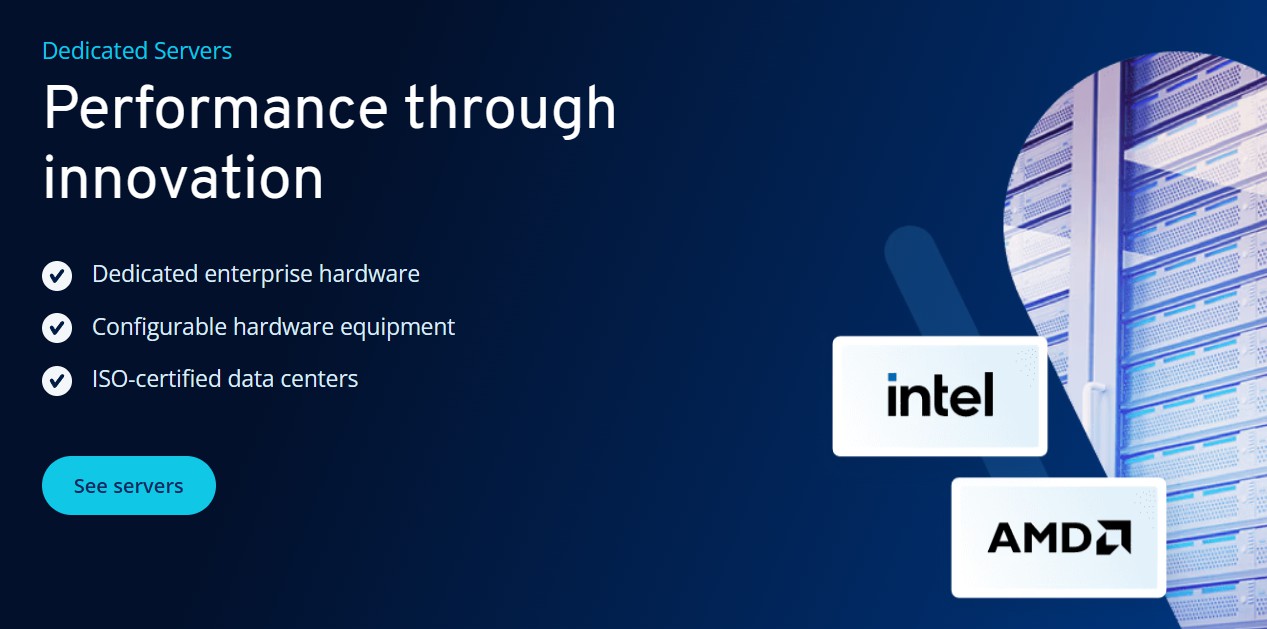
Dedicated hosting sits right at the top of the hosting tree. There's no sharing of RAM, network connection, or anything else, because the entire server is yours. It's the perfect choice for serious high-traffic sites.
IONOS is the best cheap dedicated hosting service, thanks to its excellent server deals that let you get started at just $41/month. This plan comes with 16GB RAM, 1TB HDD storage, and a 4-core Intel Xeon CPU with a respectable 3.9 GHz turbo boost. However, it’s worth noting that you will have to pay an additional $50 upfront as a setup fee.
All the regular plans are competitively priced, too, but the standout feature of IONOS dedicated hosting is the massive range of options available. Aside from choice in CPU provider, you can also opt for compute, storage, or GPU-focused plans. All plans also include a free domain, free SSL, anti-fishing, anti-spam, and firewall management.
These plans are good value and a decent choice for experienced business users who need speedy, reliable hosting but are also on a tight budget. However, a slight downside is the lack of configurability. Once you click the “Configure” button, you can only play around with RAM, storage, and the OS. If you are looking for a good amount of customization, check out Liquid Web or InterServer.
Cloud hosting

Cloud hosting offers increased reliability when compared to conventional web hosting. This is because websites or applications in cloud hosting are hosted on a network of interconnected servers, known as the cloud, instead of being hosted on a single physical server.
Genuine cloud hosting services come with auto-scaling (hands-off upgrading and downgrading of your hosting plan to meet unexpected spikes in website visitors) and geo-redundancy, where your website’s resources are shared between multiple data centers so that your website is up and running at all times.
Speaking of geo-redundancy, IONOS is one of the very few hosting services to expressly mention geo-redundancy as one of its benefits, even on its web hosting plans. The provider has 10 wholly-owned, geo-redundant ISO 27001 certified data centers; your websites will be up and running and won’t be affected due to maintenance or outages in any single location.
Prices for IONOS Cloud vary greatly depending on what type of cloud services you choose to focus on. For example, dedicated core (server core) hosting starts at $0.0037/core/hour. Block-Storage for managed Kubernetes starts at $0.0533per 30 days/GB.
In addition to being a top choice for small businesses, IONOS’s cloud offerings are also suitable for large companies thanks to its premium-level 3XL, 4XL, and 5XL plans. The top-tier plan ($420/month) includes 24 vCores, 48 GB of RAM, and 480 GB of SSD storage. Storage is a little less, though, especially for the price.
IONOS offers the best uptime with its cloud plans: 99.998%. This is on par with industry leaders Liquid Web and OVHcloud.
Does IONOS have a website builder?

If you don't have a website or much idea of how to make one, then a website builder is the simplest solution. Most come with a range of pre-built site designs called templates, and all you have to do is choose one you like, drag and drop elements you need on a page (text, images, maps, videos, contact forms), then customize the site with your own content.
IONOS has a simple website builder (it also features on our list of the best website builder platforms) with a 17,000+ royalty-free image library, a free domain, a single email account (yes, just one, with varying storage), and free SSL. Where it really shines as a website builder, though, is its selection of themes; it offers many sophisticated template designs. Even better, the templates are organized by industry and type, making it easy to find the proper layout for your website.
Additionally, IONOS has hopped on the AI wagon and now offers AI-generated websites via its website builder. As they claim, it's minimum effort while providing maximum results. They've even thrown in an AI logo generator.
The Starter plan is cheap at just $6 a month for the first six months, $12/month on renewal. The mid-level Plus plan adds an AI image generator, an AI SEO text generator, site analytics, and integration with business apps, such as booking and review systems. It offers unbeatable value for money: $1 for 6 months, $18/month on renewal.
IONOS’s website builder is great for both small businesses and scalable businesses, thanks to its multilingual translation. This can translate a site’s content into 62 different languages. Not only that, it’s even possible to have up to 25 different languages on a site at any given time.
Furthermore, you can add eCommerce support to all plans—no initial cost at all on the Starter and Plus plans, but an extra $15 on the highest plan. All plans include payment and shipping support, popular payment methods, and allow selling via Facebook and Instagram.
Can you build a web store with IONOS?

IONOS's website builder supports building a web store; then you can use its online store plans to sell up to an unlimited amount of physical and digital products. All plans come with just one email (a similar pain point as the other plans), free domain, competitor tracking, integrated payment and shipping methods, and the ability to sell directly on Facebook and Instagram.
Here, too, the best value-for-money plan is the Plus plan at $1 a month for the first six months, $30 a month on renewal. You can sell up to 5,000 physical products, get site analytics, and enjoy access to Google Ads and other Google products as well as an AI text generator and a mobile app for shop management.
Upgrade to the Pro plan to be able to sell digital products, where you will also get advanced product SEO. The highest-end plan is priced at $42 a month for the first six months of the annual plan, $92 afterwards. That's a better choice for larger stores, or if you have real ecommerce ambitions.
Other eCommerce options include using popular platforms such as WooCommerce, PrestaShop or Magento to build your store.
All in all, this is a decent set of plans covering just about every type of user, but there are still other options worth considering. HostGator's Gator and Hostinger's website builder support building basic web stores at minimal cost; Wix has better store templates and many more features, and Bluehost's WooCommerce plans include an array of business-friendly marketing and SEO extras.
How fast is IONOS?
For speed testing, we use a WordPress benchmarking tool and Siege. The former lets us see how well WordPress runs on the hosting plan, while the latter load-tests the system to see how well it stands up under pressure.
CPU & Memory | Operations with large text data | 10 |
| Row 1 - Cell 0 | Random binary data operations | 8.71 |
| Row 2 - Cell 0 | Recursive mathematical calculations | 8.92 |
| Row 3 - Cell 0 | Iterative mathematical calculations | 9.5 |
Filesystem | Filesystem write ability | 8.81 |
| Row 5 - Cell 0 | Local file copy and access speed | 8.91 |
| Row 6 - Cell 0 | Small file IO test | 9.34 |
Database | Importing large amount of data to database | 0.85 |
| Row 8 - Cell 0 | Simple queries on single table | 2.61 |
| Row 9 - Cell 0 | Complex database queries on multiple tables | 5.1 |
Object Cache | Persistent object cache enabled | 0 |
Network | Network download speed test | 10 |
Overall | Your server score | 7.2 |
Our WordPress core benchmark tests showed that IONOS performed remarkably well in CPU and memory performance. These are two highly essential areas for WordPress performance. However, it lagged slightly behind in database operations. This means that at higher traffic volumes, database performance is likely to be the bottleneck for your website.
Overall, though, these performance numbers put IONOS ahead of many competitors in the shared hosting space. Based on performance alone, I'd say their shared hosting plans are at least worth a try.
| Row 0 - Cell 0 | 5 | 9 | 15 |
Transactions | 4370 | 6835 | 5839 |
Availability | 100 | 99.88 | 99.1 |
Elapsed time | 299.25 | 299.97 | 299.64 |
Data transactions | 247.82 | 385.03 | 325.24 |
Response time | 0.34 | 0.39 | 0.76 |
Transaction rate | 14.6 | 22.79 | 19.49 |
Throughput | 0.83 | 1.28 | 1.09 |
Concurrency | 4.99 | 8.96 | 14.77 |
Successful transactions | 4370 | 6835 | 5839 |
Failed transactions | 0 | 8 | 50 |
Longest transaction | 2.59 | 3.88 | 12.3 |
Shortest transaction | 0.13 | 0.14 | 0.15 |
The standard shared web hosting plan we tested on states that up to 100 visitors can be handled at once, but based on transaction totals, availability ratings, and response times, this claim is slightly dubious. Even with 9 concurrent users, we observed several failed transactions appearing in our test results.
Claims notwithstanding, the overall load test results indicate that IONOS shared hosting performs better under pressure than the average web host. There are indeed failed transactions, but they occur less frequently than we're used to and, honestly, are pretty good where shared hosting is concerned.
How easy is IONOS to use?
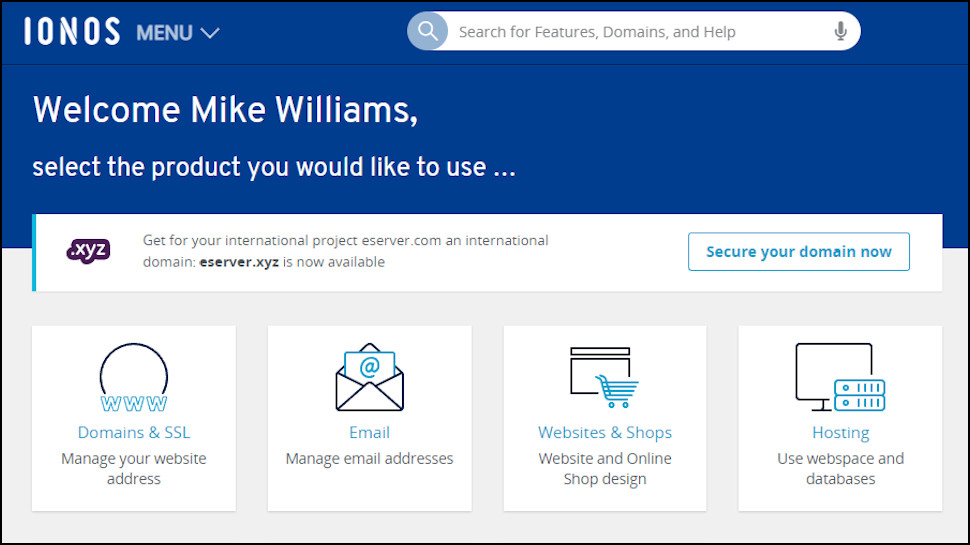
Log in to many web hosts, and you'll find familiar industry-standard platforms: WHM to manage your accounts, cPanel for all your key website management tasks, and Softaculous to install and manage WordPress reliably. That's generally good news, partly because they're top-quality tools (which is why they became industry standards), but also because if you've any experience of web hosting, you're likely to know how to use these already.
IONOS ditches all these in favor of its own custom control panels. That has some advantages (it probably saves a pile of cash in license fees, helping IONOS keep its prices low), but it also means even expert users will have to spend some time exploring the system to find the functions they need.
This isn't as easy as we'd like. Functions aren't always organized intuitively, and everyday tasks, such as logging into a WordPress site, took longer to find than we expected.
IONOS' website search engine helps a little. Enter 'WordPress', say, and it doesn't just list top WordPress support articles. A 'Product and Actions' includes control panel tasks such as 'Install WordPress', and clicking these links takes you directly to that page. It's a good idea, but it doesn't quite work everywhere. We tried to find the right keywords to show a WordPress newbie how to log in to the dashboard, for instance, but never quite managed it.
If you're an experienced user who makes extensive use of low-level cPanel and other features, this could easily be an issue. Even once you've found the functions you need, there's no guarantee they'll deliver precisely the same results.
But if you're only after the hosting management basics - configure your domain, set up some email addresses, install WordPress - then this may not matter very much. Sure, it might take you a few extra minutes to master the control panel basics, but after that, you'll use IONOS much like any other host.
What is IONOS support like?
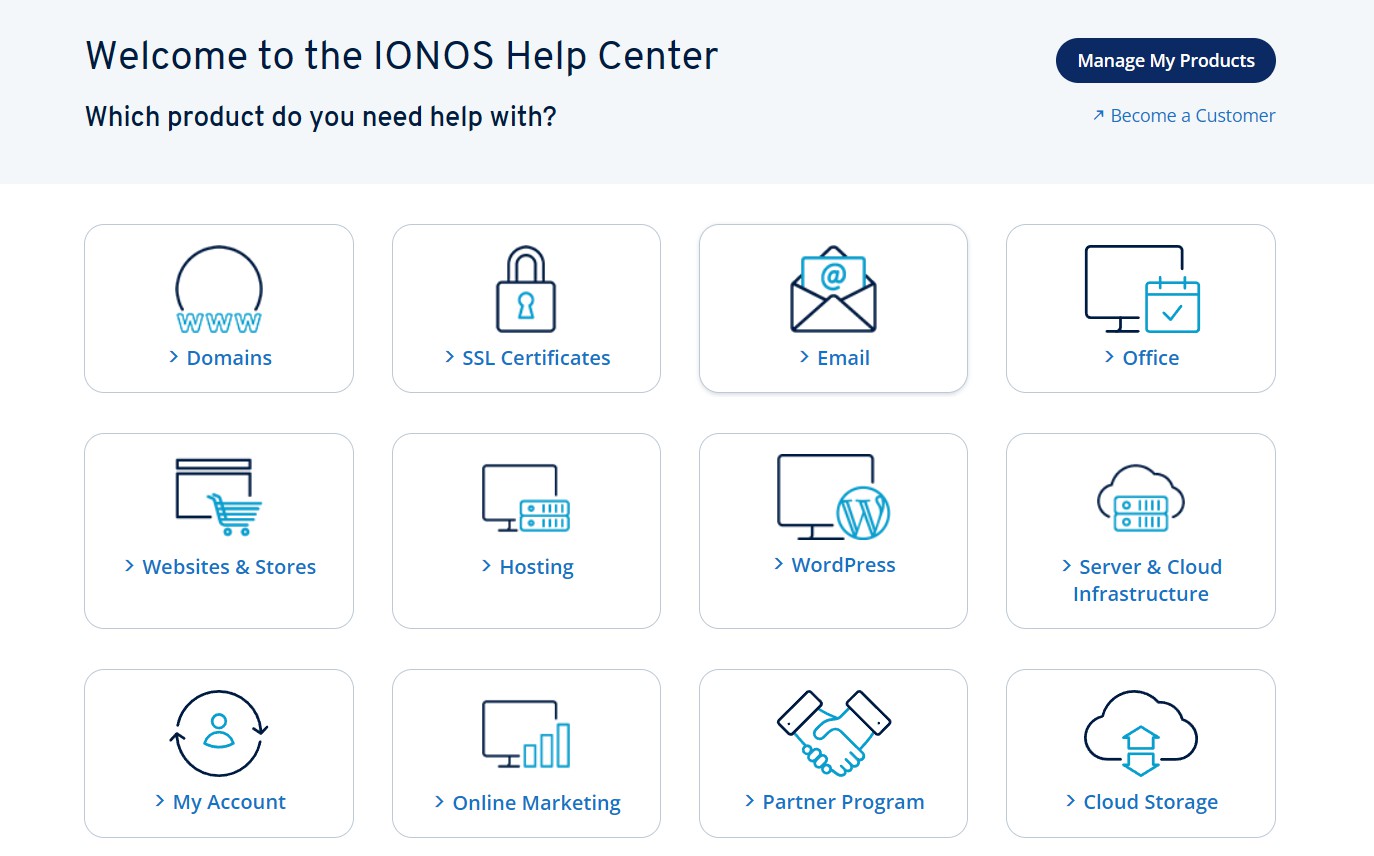
IONOS offers support via its website knowledgebase, phone, live chat and email. The support site ‘Help Center’ has a considerable number of articles, sensibly organized into categories such as WordPress, Email, Domains, Hosting, Online Marketing, My Account, SSL Certificates, and loads more. Some of these articles are a little short, but there's a lot of valuable information here.
Unusually, telephone support doesn't simply mean 'dial this international number and be left on hold wondering what this is going to cost.' You can book an appointment and have the company call you. When we tried this at 12:10pm, the site offered 15-minute slots from 1pm, so you probably won't have to wait long for a response. However, if that's not convenient, you can book up to 4 days in advance from 8 am to 8 pm.
We set up an appointment, and sure enough, a call arrived within 30 seconds of our starting slot time. The agent listened carefully to our query about installing WordPress on subdomains, clearly explained what we needed to do, and sent us additional advice via email. Impressive.
IONOS also offers a shocking amount of localization in its support efforts. It offers 14 phone numbers for local support in different countries. Furthermore, if you click on the country’s name - Germany, for example - the entire support site, including all the help articles, loads in German. This is really good.

One notable point was its Live Chat support. The service was down when we tried to use it. However, that's not the point here. When services are down, most hosts aren't as transparent and often leave customers wondering what's gone wrong. IONOS was upfront about its Live Chat being down, which earned our respect.
Final verdict
IONOS cuts a few corners with its shared hosting plans (no free migration, only one email account, below-par performance), but they're still great value. If you need more, there's a wide range of WordPress plans, and the company has rock-solid VPS, dedicated, and cloud hosting products to cater to everyone, from enthusiastic amateurs to SMB and enterprise users.
There’s also a handy and feature-rich website builder on offer, plus startups and small businesses have the option to benefit from IONOS experts, who will build a professional online store or website for them.
Sign up for 1&1 Ionos US deals here.
Sign up for 1&1 Ionos UK deals here.
IONOS FAQs
What payment types does IONOS support?
IONOS accepts payment by card and PayPal.
Does IONOS offer refunds?
IONOS has a general 30-day money-back period covering most hosting products and a handful of other services (check the small print for the precise details).
Domains, SSL certificates, cloud and bare metal servers are not included.
Does IONOS have an uptime guarantee?
IONOS has a 99.99% uptime guarantee for its hosted web pages. If the company doesn't hit the target, you can claim an account credit to match the real downtime (90 minutes downtime, your account is credited with the cost of 90 minutes hosting).
At first glance, that looks better than most providers, who only offer a 99.9% uptime guarantee. But limiting compensation to the actual downtime isn't as generous. The top-of-the-range shared hosting plan is $8 a month in the first year, for instance, or $0.263 a day. If your site is down for eight hours, that could be a disaster for you, but even IONOS admits responsibility, you'll get just $0.09. It's not even worth your time asking.
ScalaHosting 'only' offers a 99.9% guarantee, but if its uptime is less than 99% (that's only seven hours, 18 minutes and 17 seconds in a month) you'll qualify for a whole month. That's still not a huge amount, and it's best to have no downtime at all, but we like the principle: if the service doesn't hit a certain standard, you effectively get it for free.
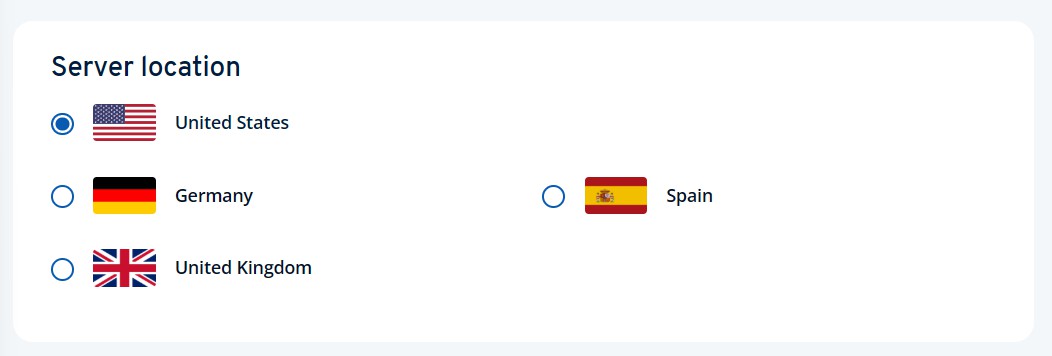
Where are IONOS's data centers?
IONOS has ten data centers located across the USA, Germany, the UK, and Spain. The company lets you choose your preferred data center for some of its higher-end products. You can't pick a data center if you're buying regular shared hosting, for instance, but you do get the option with VPS plans.
What is my IONOS IP address?
Log into your IONOS control panel.
Click Domains and SSL, then find and click your domain in the list.
Click the DNS tab.
Scroll down and look for a record with the type A, the host name @ (or www) and the service 'Webhosting.'
Your website server's IP address is displayed in the Value column for that A record.
What are IONOS's nameservers?
If you sign up for IONOS hosting but are using a domain managed elsewhere, you may need to find IONOS' nameservers to connect the domain to your hosting plan. Sounds complicated, but fortunately it only takes a few clicks.
Log into your IONOS control panel.
Click Domains and SSL, then find and click your domain in the list.
Click the Nameserver tab and the control panel displays the IONOS nameservers for your account.
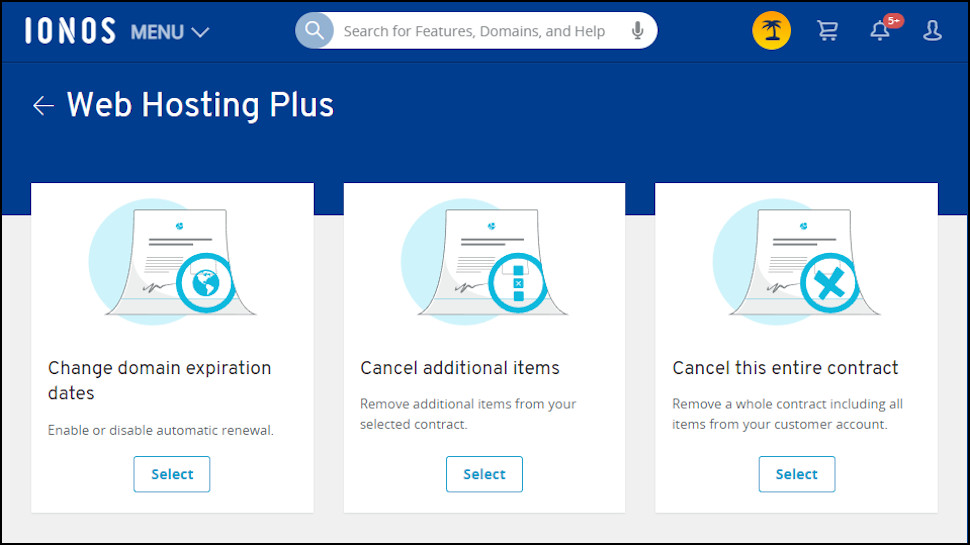
How do I cancel an IONOS product?
Log into the IONOS control panel.
Click the Account icon top-right, and select Contracts & Subscriptions.
Find the plan you'd like to cancel, click the gear icon to its right and choose Manage Contract.
Click 'Show Cancellation Options' and decide what you'd like to cancel: an entire contract, or specific add-ons only.
If you got a free domain with your plan and don't need it, select the 'Change domain expiration dates' option to disable automatic renewal.

Timothy Shim is an independent writer, editor, and lifelong tech enthusiast. He started his career in Information Technology, managing systems and networks before moving into journalism. His key focus areas include web hosting and digital privacy tools.
- James CapellB2B Editor, Web Hosting
You must confirm your public display name before commenting
Please logout and then login again, you will then be prompted to enter your display name.
